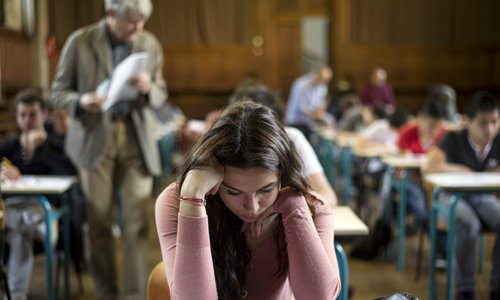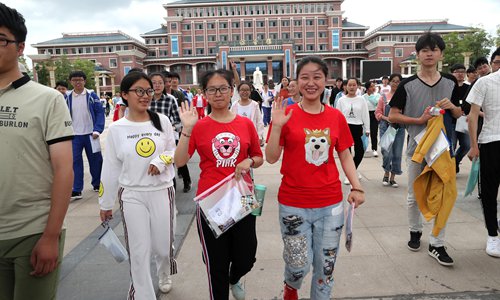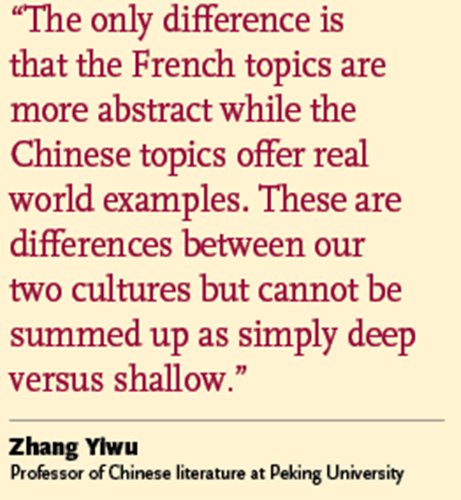○ Every year following China's gaokao (national college entrance exams), the essay questions become a center of discussion
○ Critics say many gaokao essay questions fail to address the deeper meaning of life
○ Such discourse shows Chinese public's questioning of China's educational system, especially the testing mechanism that selects talent

French students figure out a philosophy test during the French baccalauréat (BAC) high school graduating exams. (Photos: VCG)
Every year, after the gaokao (national college entrance exams) finishes in early June and the exam questions are publicly disclosed online, the Chinese public breaks out into heated discussions and even criticism.
Among these discussions, one theme surfaces every year - the comparison of Chinese exam essay questions to the philosophy essay questions of the French baccalauréat (BAC) high school graduating exams.
Because the BAC also takes place in mid-June, and the form of its philosophy exam is similar to the Chinese subject exam in the gaokao with an assigned essay question, the two exams are often compared by Chinese netizens.
Netizens show overwhelming admiration for the French BAC exam questions, saying they are much deeper and require more critical thinking than that of the Chinese exam. Such discussions show the reoccurring criticism of and debate on the Chinese examination-oriented education system.

Students walk out of the gaokao examination rooms on June 7 in Jiangxi Province.
Comparing questions
This year, Chinese essay questions became the center of attention last Thursday, the first day of the gaokao.
While there were traditional questions that test students' language usage and understanding of the core of humanities studies, such as Jiangsu Province's "Describe how language enriches livelihood, defines life and carries on civilizations," many essay questions closely follow current events and the government's focus of attention.
In the exam issued to students in Beijing, for example, there were two essay questions to choose from, "New youth in the new era: Growing up as our country develops" and "Describe a beautiful picture in which people and nature are in harmony."
Another essay question, issued in 10 provinces around China, requests students to write a letter addressing young people in 2035, telling them how this generation lived and grew with China, and how they pursued their dreams together.
The year 2035 is not just a random number; it is the year set by the latest government reports to be the point when China completes its social modernization process.
"If you don't read government work reports carefully or watch CCTV news, you probably wouldn't be able to write this essay," netizens commented.
Some joked that the TFBoys, a popular boy band, may be able to receive a perfect score as they sang a song about China's new era and social modernization in 2035 during the Spring Festival Gala in February.
At around the same time, a WeChat public account that focuses on French studies published an article listing the essay questions of the BAC for the past 10 years. This year, the pool of exam questions consisted of examples such as "Can people be rid of preconceived biases," "Can desire be satisfied by reality" and "Is there a definite answer to the question 'Who am I?'"
At the end of the article, the author commented, "There's a difference called the power of critical thinking." Immediately, the internet was filled with admiration for the BAC questions. Some said the Chinese essay questions failed to address the deeper meaning of life.
Some also brought up counterpoints. Daxiang Gonghui, a WeChat public account that aims to explain complex issues with in-depth and thoughtful articles, wrote that the French themselves do not even welcome this format of exams.
It said that there is no definite evaluation criteria for these philosophy essays and grades can vary greatly depending on the reviewing teacher. At the same time, the questions can be cliché and spur routine answers instead of actually inspiring the mind.
Frank Zhu, who studied at a French university, told the Global Times he agrees with the article. "I think philosophy is a great way to train the mind. However, for high-school students, most still memorize a few example essays to pass the test," he said.
"In practice, I think it's still a little early to put philosophy questions into tests for high-school students, while the Chinese questions are closer to reality," he added.

Imprints of eras
Advocates say they are not rooting for the French exams per se, but rather an entirely different education system.
The essay questions in the BAC are a representation of France's tradition of philosophical education, the fruit of its culture and history. The grades one gets on this test have become a measurable "cultural capital" in France, wrote Zhao Yang, a commentator for the Southern Metropolis Daily.
"On some level, these humanistic questions that are full of critical thinking are shaping the French themselves," he wrote.
Former French president Nicolas Sarkozy only scored 8 out of 20 points on the test and was mocked by media as the most illiterate president in France's history.
Meanwhile, the essay questions on the gaokao carry the imprints of each era of Chinese history. In 1978, the second year the gaokao was resumed after being disrupted for 10 years during the Cultural Revolution (1966-76), the essay question was summarizing the article "Speed is a political issue," originally written by Hua Guofeng, a former chairman of the Communist Party of China.
In the 1980s, essay questions showed signs of reform. In 1980, Leonardo da Vinci became the first foreign figure to appear in the essay questions, as the exam required students to write about how he began by drawing eggs repeatedly and finally became a great artist.
After the 1990s, the questions became more open and flexible, more attentive to real life, sometimes even requiring imagination. Examples include, "Overcoming vulnerability" and "If memory can be transplanted."
A woman who majored in philosophy in college told the Global Times she disagrees with Daxiang Gonghui's article dismissing the BAC, saying France's philosophy education might seem cliché, but China really is in no position to look down on their education when its own is not worthy of praise.
"When you have malnutrition, you go off and laugh at someone else for being spoiled in riches," she said. "Why can't we just teach our children how to write about Plato first?"
Indeed, such discussions show the reoccurring reflections on a Chinese exam-orientated education system.
"Rather than debating over the French essay questions, we should rethink what's missing in our education," commented one netizen.
Critics say Chinese education only teaches students how to take exams, the only criteria that measures what kind of college they should get into, but not appreciation of beauty, or critical thinking.
Social ladder climb
There is also a trend of valuing sciences over humanities, because it leads to better jobs in the future. At the same time, it is worth noting that the gaokao system has created a path for many who would otherwise be stuck in poverty and in their own social ranks.
Every year, there are news reports about students who succeeded in the exams and climbed up the social ladder.
Specific examples compiled by media reports this year include a 19-year-old woman named Wei Ting, who came from a village in Guangxi Zhuang Autonomous Region. Her parents farm at home and her brother works all sorts of jobs to pay for her education. Last year, she made it to a medical school in Guangxi through the exams.
Some also believe that the Chinese exams are the right fit for China's society and Chinese citizens should have more confidence in their own system.
Zhang Yiwu, a professor of Chinese literature at Peking University, wrote for the Global Times previously when commenting on the comparison between French and Chinese exams that it is beneficial to take in other countries' experiences, but "there's no need to exaggerate the comparison and totally denounce ourselves."
"Both the Chinese and French test questions ask students to show their understanding and opinions on some matters. The only difference is that the French topics are more abstract while the Chinese topics offer real world examples. These are differences between our two cultures but cannot be summed up as simply deep versus shallow."


